Kategorie: ‘Mikro- und Nanoeletronik’
Max Lemme receives RWTH Fellow award
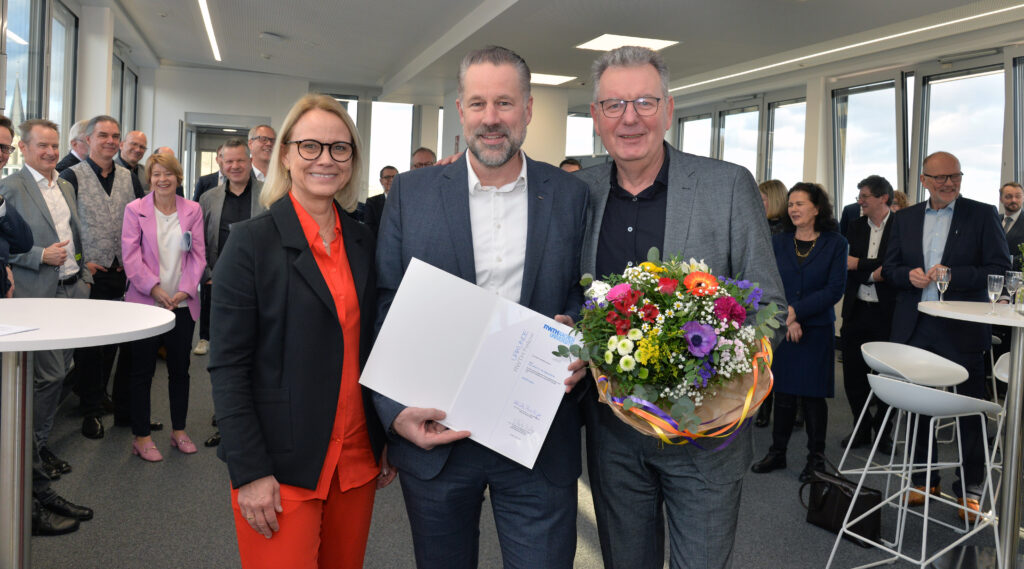
Vice Rector Sabine Brück (left) and Vice Rector Matthias Wessling (right) honour Professor Max Lemme as RWTH Fellow. Photo: Andreas Schmitter
Professor Max Lemme, head of the Department of Electronic Devices, and Professor Harald Müller, head of the Department of Medieval History, are new RWTH Fellows. With this title, the RWTH Aachen University honours professors who have distinguished themselves in research and have rendered outstanding services to the RWTH Aachen University.
Professor Max Lemme is a highly respected expert in the field of devices based on 2D materials and enjoys international recognition. One of his major achievements is a study on a graphene-based field-effect transistor, which has been cited 1353 times to date. He has successfully obtained research funding, including an ERC Starting Grant in 2012 and a Proof of Concept Grant from the European Research Council in 2018. He was also awarded a prestigious Heisenberg Professorship by the German Research Foundation in 2012. Max Lemme was instrumental in the establishment of the NeuroSys Cluster of Excellence and is its spokesperson. He is also an expert reviewer for the European Community and regularly participates in major conferences in the field of semiconductor devices, including IEDM, ESSDERC, DRC and ULIS.
The award he holds was introduced as part of the Excellence Initiative in 2013 and is based on nominations from the Deans of the Faculties.
Click here to go to the website of the Chair of Electronic Components.
Biosensors for health: Team AixSense receives multiple awards at Sensus 2023
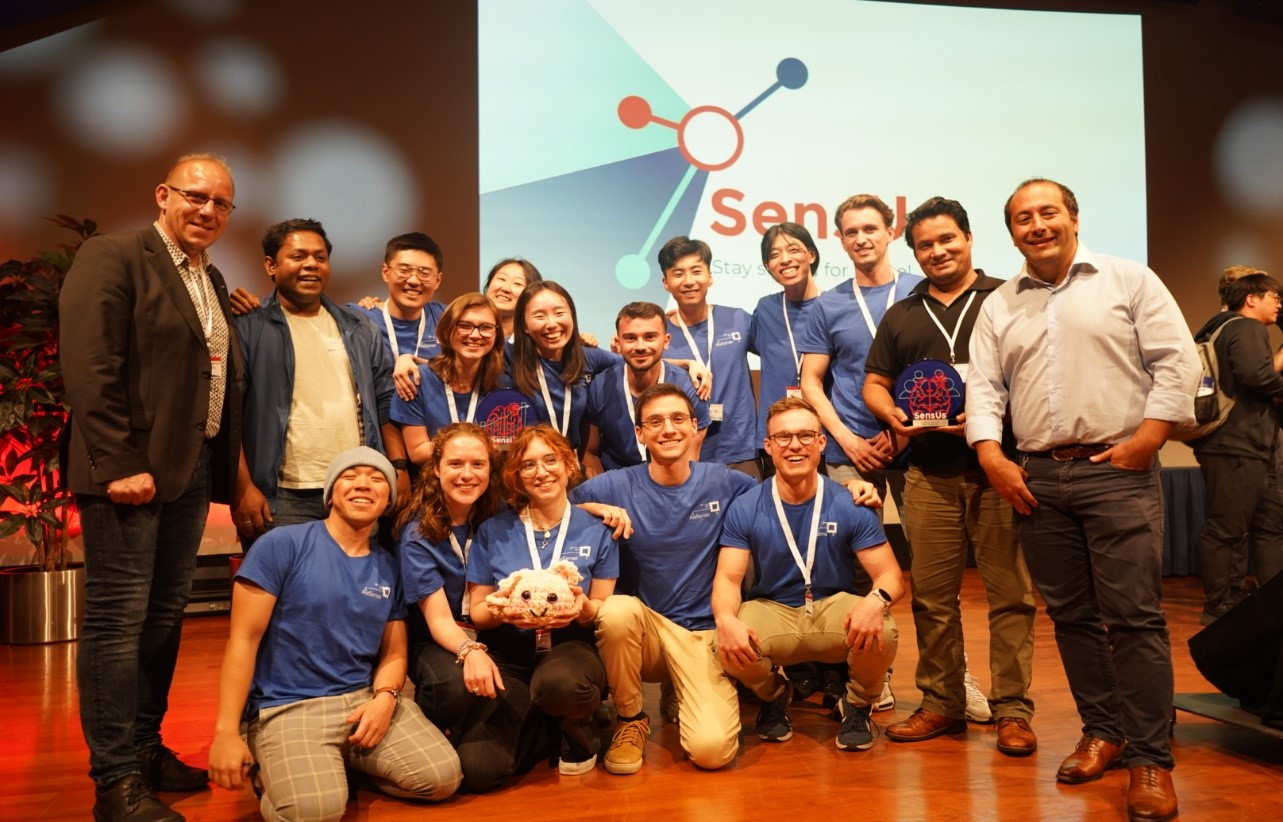
© Erdenebat Battseren
With the development of an innovative blood-based biosensor for the detection of traumatic brain injuries, the AixSense team stood out in an impressive field of competitors.
Once again this year, 15 student teams from all over the world took up the challenge of creating a biomarker prototype for detection and thus advancing sensor technology for improved healthcare.
RWTH Aachen’s AixSense team excelled in the competition, which was hosted by Eindhoven University. Their biosensor chip, which was manufactured with extreme precision in the cleanroom laboratory, caught the attention and recognition of the jury. This led to an award of the coveted Translation Potential prize. In addition, AixSense secured the Public Inspire Award by cleverly using social media platforms and collecting 1000 votes within 24 hours. The Aachen team’s outstanding engagement culminated in a first place in the vlog competition, which earned them the prestigious SensUs Gold Medal.

© SensUs
After the previous topics on antibiotic resistance, rheumatism, epilepsy, influenza A and sepsis, the teams from universities around the world explored a new pathology: Traumatic Brain Injury, defined as sudden external injury resulting in brain damage. Every year, around 27 to 69 million people worldwide are affected by this. The challenge here is the range of injury severity, which makes accurate detection all the more relevant.
„We are honored to have participated in such competition representing the university on an international level. We are also proud that all our team efforts were awarded with several prizes for RWTH Aachen University,”concludes the team leader of AixSense.
The Institute of Materials in Electrical Engineering at RWTH Aachen University deserves special credit for putting together this exceptional team, led by Dr Vivek Pachauri and Professor Sven Ingebrandt, with Dibyendu Khan and Aidin Nikookhesal supervising.
Check out the SensUs page for more up-to-date information on this year’s competition.
Writing Workshop E-Technology Winter Semester 2023/24

© Martin Braun
You are studying a bachelor or master subject at the Faculty of Electrical Engineering and Information Technology? The study or final thesis is now imminent? Then get the support of the Language Center and benefit twice!
The semester course in presence strengthens the subject-specific writing and text competence with customized writing advice. Practical workshops based on text examples from electrical engineering and information technology provide know-how on text structure, language, style and citation. The online expert feedback in the writing consultation helps to individually apply what has been learned in the course to the current project or thesis. Voluntary participation in an introductory course on technical subject research at the University Library is also offered as part of the course.
After successful participation, the Language Center awards a certificate and 3 CP, which are creditable according to the respective examination regulations.
International students must prove a German language level of at least C1.2 as a prerequisite for participation in the course.
Registration takes place via the user account at the Language Center.
Registration deadline: September 29 – October 10, 2023
Dates:
| Group 1 02.54478 |
Group 2 02.54479 |
|
Wed, 08.11.2023 Wed, 22.11.2023 Wed, 06.12.2023 Wed, 10.01.2024 each from 09.00 to 12.00 hrs |
Wed, 15.11.2023 Wed, 29.11.2023 Wed, 13.12.2023 Wed, 17.01.2024 each from 09.00 to 12.00 hrs |
Contact for queries: schreibzentrum@sz.rwth-aachen.de
“The world of tomorrow” in the Aachen city region.
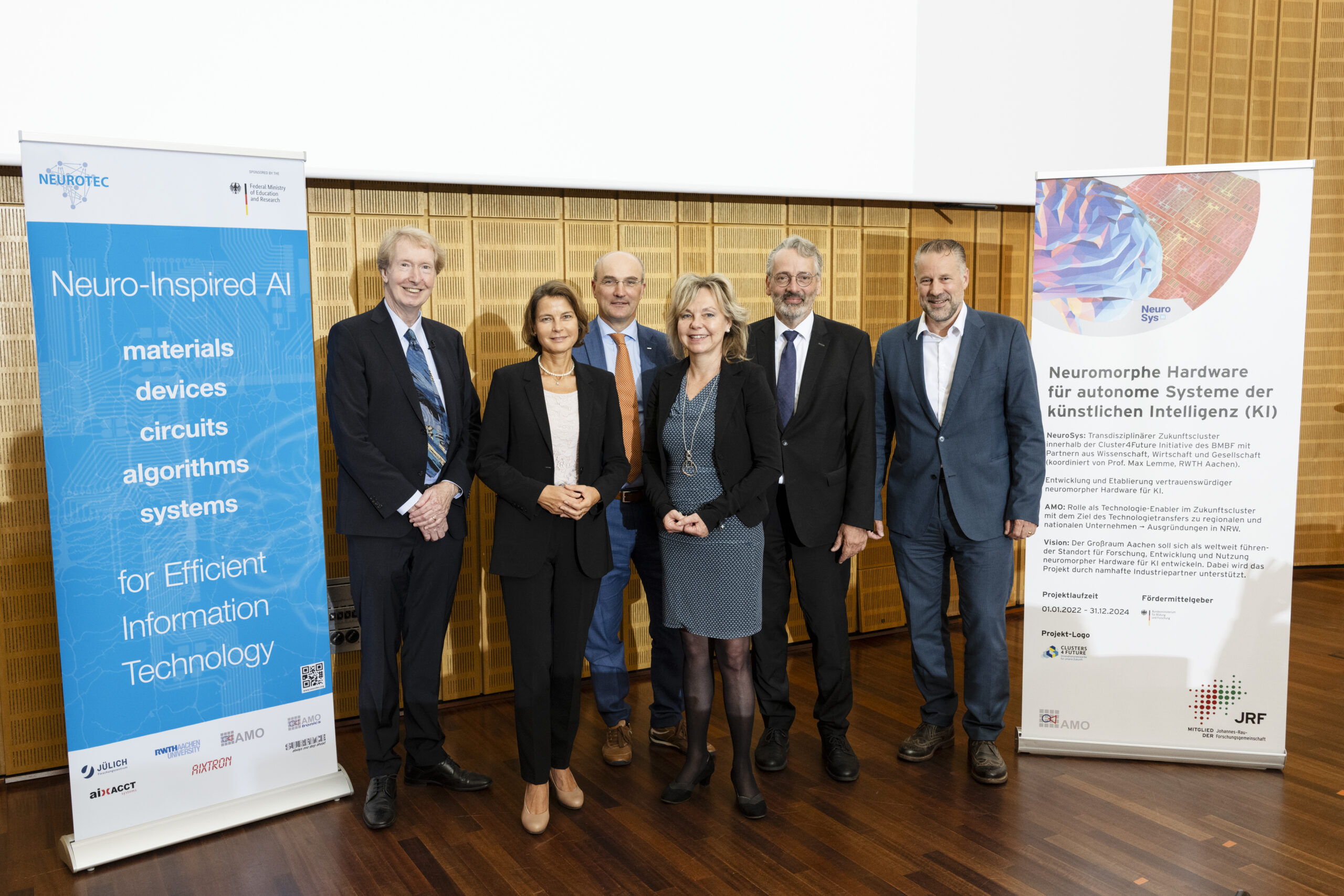
From left to right: NEUROTEC Coordinator Prof. Rainer Waser, FZJ Board Chair Prof. Astrid Lambrecht, RWTH Rector Prof. Ulrich Rüdiger, BMBF State Secretary Prof. Sabine Döring, MKW-NRW State Minister Thorsten Menne, NeuroSys Coordinator Prof. Max Lemme © Kurt Steinhausen Forschungszentrum Jülich
Neuroinspired computer chips could make the decisive contribution to meeting the growing energy requirements of artificial intelligence (AI). Researchers presented the current status and future prospects of this groundbreaking technology in the course of the Jülich-Aachen Neuromorphic Computing Day on August 30, 2023.
By mimicking the way the human brain works, neuromorphic chips offer an enormous increase in energy efficiency and thus only open up groundbreaking possibilities for applications such as autonomous driving and Industry 4.0 through real-time data processing. Designed in close collaboration between RWTH Aachen University, Forschungszentrum Jülich and partners from high-tech companies and start-ups, researchers offered insights into their work. In addition to around 200 guests from science, industry and politics, BMBF State Secretary Sabine Döring also accompanied the event.
Close cooperation between research institutions and companies in the region is at the heart of this initiative. The model enables the direct transfer of research results to industry and strengthens regional innovative power. Not only do regional structural change and job creation play a role here, but also the vision of independent chip production in Germany.
“With our research, we span the entire value chain, including sociological and ethical issues that disruptive technologies always raise. This offers opportunities at many technological levels for regional companies and startups to accelerate structural change. We are already seeing initial effects on the labor market and business investment. In the long term, semiconductor manufacturing in the region would ideally complement the existing, comprehensive and internationally recognized expertise and infrastructure and once again significantly increase the attractiveness of the region for the excellently trained brains from the research center and RWTH,” sums up NeuroSys coordinator Prof. Max Lemme from RWTH Aachen University and Managing Director of AMO GmbH.
The impressive future prospects of this technology and the cooperation between research and industry in the region thus create a dynamic that not only drives groundbreaking technologies, but also inspires young talents to get involved at RWTH Aachen University and contribute to this exciting field of research.
Further information on the Jülich-Aachen Neuromorphic Computing Day, as well as on the NEUROTEC project and the NeuroSys future cluster, can be found on the Forschungszentrum Jülich website.
Neuroscience simulators of the future: How a new approach is taking research to the next level
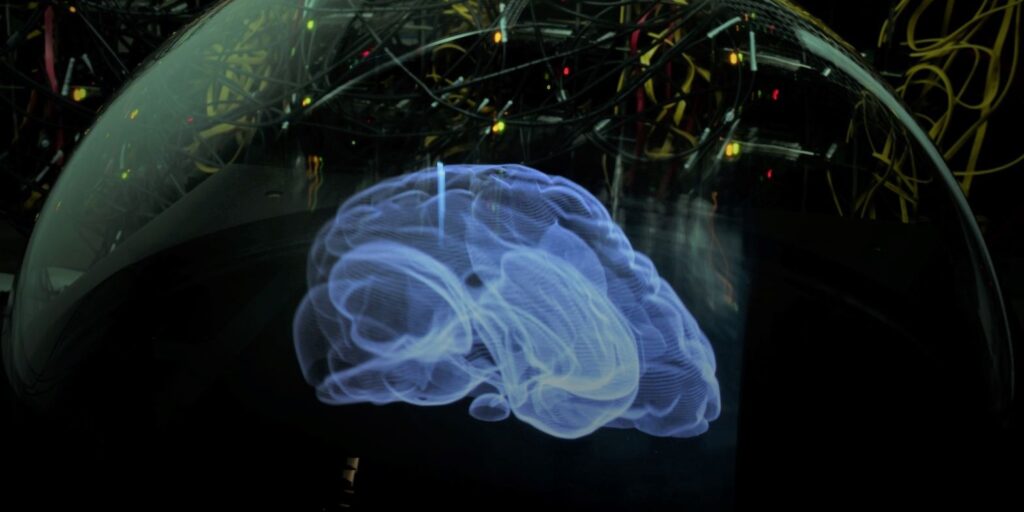
©Chair of Integrated Digital Systems and Circuit Design
A new type of framework called “neuroAIˣ” has been developed by the group of RWTH professor Tobias Gemmeke. This framework is highly flexible and makes it possible to better understand and model the brain and its information processing.
The brain is one of the most fascinating and complex organs, raising many questions. How does it work? How does our consciousness and behaviour emerge from the activity of billions of neurons? How can we learn from the brain to build more powerful and efficient computers?
To answer these questions, neuroscientists are studying the structure and function of microcircuits in the brain, which consist of groups of neurons. These microcircuits are responsible for processing information in different regions of the brain. By analysing how neurons in these circuits work together, they can develop models that explain how the brain processes information and how behaviour results. To test and improve these models, computer simulations of artificial neural networks are essential.
The “neuroAIˣ” framework provides a platform to perform such computer simulations. It is highly flexible and allows different types of neural networks to be created, trained and analysed. Both biologically plausible and artificial neural networks can be considered. The framework is also scalable and can be used on different hardware platforms, from conventional CPUs to specialised chips for brain-inspired computing.
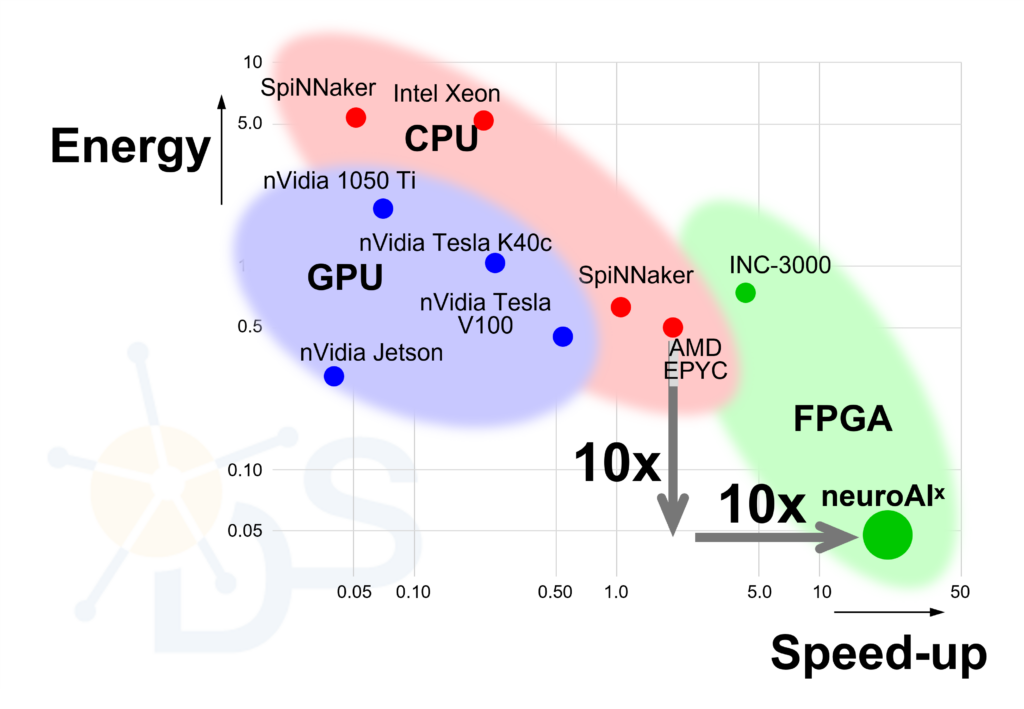
neuroAIˣ FPGA cluster is ten time faster and ten time more energy efficient than today’s best neuroscience simulators at running of biological neural networks. ©Chair of Intrinsic Digital Systems and Circuit Design
The framework consists of two components: a software tool that can rapidly evaluate neuromorphic architectures and a hardware cluster composed of 35 FPGA (Field-Programmable Gate Array) cards. The hardware cluster has two functions: It can be used as a test platform to calibrate the software tool and test the proposed architectures for efficiency. It can also act as a neuroscience simulator, beating the best existing platforms by a factor of ten in terms of speed and energy efficiency.
“We are pleasantly surprised by the high speed-up and energy efficiency achieved by our system, as the focus of our work was on the flexibility and reproducibility of the simulator system,” explains Kevin Kauth, PhD student in Tobias Gemmeke’s group and one of the main developers of the project.
A possible future vision of Gemmeke and his team is to build a high-capacity FPGA cluster and develop a web platform that will allow neuroscientists and AI experts from all over the world to use the cluster via the cloud.
You can find more information about this exciting project at neuroaix.de.
A detailed description of the neuroAIx framework has been reported in the open-access journal Frontiers in Computational Neuroscience.
Excellent placement in global university ranking

© Kurt Beyer
In electrical engineering, RWTH Aachen is one of the three best German universities. This is the result of the internationally highly regarded QS Ranking by Subjects of the British information service provider Quacquarelli Symonds. Presented in its latest version, the subject ranking is based on various criteria that are weighted according to subject. An online reputation survey among university graduates and employers accounts for between 40 and 100 percent of the total points and is considered the most important indicator. Citations, which scientific papers from universities receive on average, account for up to 60 percent. For some engineering and natural science subjects, international research networks are also taken into account.
The Aachen University of Excellence was able to place itself on the winner’s podium in many subjects throughout Germany and is also convincing in an international comparison. In ten subjects, it placed among the 100 best worldwide. RWTH did particularly well in the subjects of mining engineering with 15th place and mechanical engineering with 19th place.
For more information: www.topuniversities.com
“Hex-Hex”: Text – Thesis written!

The right magic formulas are taught in the courses of the “Schreibwerkstatt E-Technik”. The face-to-face course offers bachelor’s and master’s students at the Faculty of Electrical Engineering and Information Technology customized preparation for writing their upcoming seminar papers or dissertations. Participants benefit from acquired basic knowledge and writing strategies, which can be further developed in an individual online consultation. Upon successful participation, students earn a certificate and 3 CP, which can be credited towards elective credits.
International students must prove a German language level of at least C1.2 as a participation requirement for the course. The online writing consultation takes place in either German or English.
Registration deadline: March 27 – April 3, 2023
Dates:
| Group 1 02.84000 |
Group 2 02.84000 |
| Wednesdays April 19, 2023 Mai 3, 2023 Mai 17, 2023 June 6, 2023 each from 2.30 to 5.30pm |
Wednesdays April 26, 2023 Mai 10, 2023 Mai 24, 2023 June 21, 2023 each from 2.30 to 5.30pm |
Registration is via user account at Language Center.
Contact for inquiries: schreibzentrum@sz.rwth-aachen.de
Top placements in international ranking
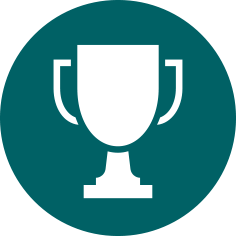
The portal Research.com informs in the newly published ranking that the Electrical Engineering and Information Technology of the RWTH achieved the 2nd place in the Germany-wide comparison. Internationally, RWTH ranks 65th in this discipline.
Research.com evaluates the frequency of citations of scientific articles and other publications for the ranking. Data from the OpenAlex and CrossRef databases are used for the evaluation. Researchers are ranked using the D-index, a variation of the H-index, which measures citations to their scientific papers within a discipline. All those who achieve a D-index of at least 30 are included in the rankings. The sum of the D-indexes of all listed scientists of a university is then decisive for its placement in the university ranking.
Accordingly, the following RWTH Electrical Engineering and Information Technology professors have qualified for the ranking:
- Dirk Uwe Sauer from the Chair of Electrochemical Energy Conversion and Storage Systems Engineering.
- Rik W. De Doncker from the Chair of Power Electronics and Electrical Drives
- Heinrich Meyr from the Chair for Distributed Signal Processing
- Antonello Monti from the Institute for Automation of Complex Power Systems
- Max Lemme from the Chair of Electronic Components AMICA – Advanced Microelectronic Center Aachen
- Steffen Leonhardt from the Chair of Medical Information Technology
- Petri Mahönen from the Chair and Institute of Networked Systems
- Rainer Leupers from the Chair of Software for Systems on Silicon
Encouraging women to take up MINT professions – support for ZDF heute journal
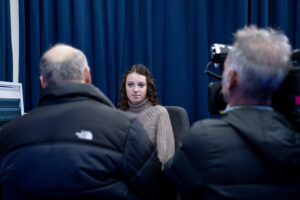
BA student Helena in an interview with the ZDF heute journal team. Photo: C. Antweiler
At the end of January, the team from ZDF heute journal visited the Institute for Communication Systems at RWTH Aachen University for a report. The report provides insights into the topic of “women in MINT subjects”, which are sometimes chosen even less by women and girls, such as mathematics, computer science, natural science and technology. Editor Peter Böhmer from the North Rhine-Westphalia State Studio researched the reasons for the low quota of women at RWTH Aachen University and what approaches could be taken to change this.
Through interviews with various female RWTH students, including our BA student Helena, as well as with Univ. Prof. Dr. rer. nat. Aloys Krieg, Prorector for Teaching, the heute journal team was able to gain an impression. The Institute for Communication Systems and a lecture by Prof. Peter Jax provided the pictorial framework for the report.
You can find the report in the ZDF Mediathek.
Friedrich Wilhelm Awards 2022
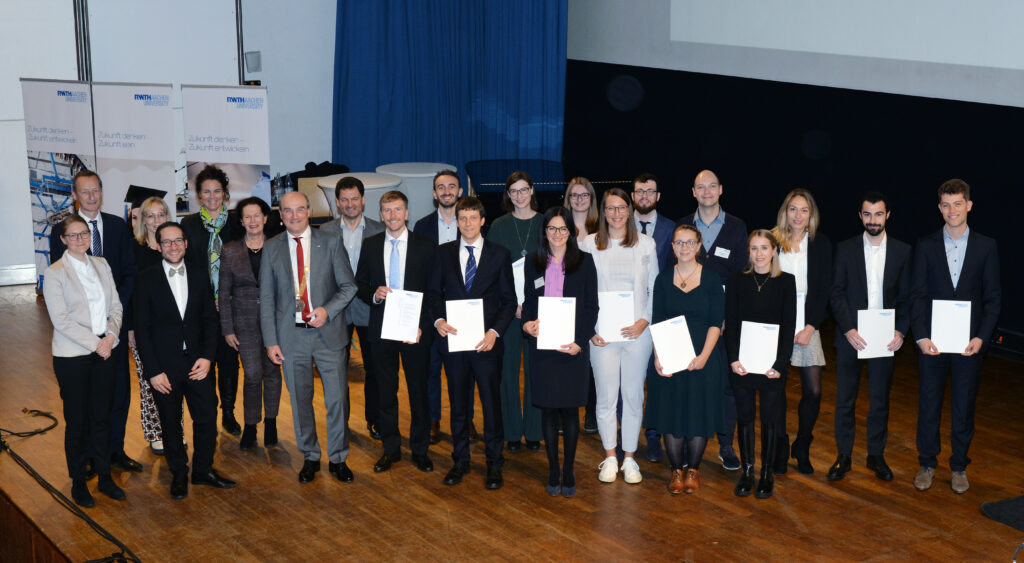
RWTH Rector Ulrich Rüdiger honored 17 outstanding graduates of RWTH Aachen University with the Friedrich Wilhelm Awards 2022.
Photo: Andreas Schmitter
Honoring outstanding achievements by RWTH Aachen graduates
The Friedrich Wilhelm Prize is awarded annually by the foundation of the same name in the form of prize money to students and researchers at RWTH Aachen University who have been selected for their outstanding achiements in their theses. Among this year‘s recipients are Maxim Christian Maria Müllender, Master of Science, from the Institute of High Voltage Equipment and Grids, Digitalization and Energy Economics and Laurids Schmitz, Master of Science, from the Institute for Power Electronics and Electrical Drives. Both winners were recognized due to their excellent master‘s theses.
Funding for research and teaching
The name of the foundation goes back to the Prussian crown prince and later Emperor Friedrich Wilhelm III., who founded a polytechnic institute in the Rhine province in 1858 using a donation from the Aachen and Munich fire insurance companies. In doing so, he laid the foundation for both the Rheinisch-Westfälische Technische Hochschule and the Friedrich Wilhelm Foundation, which is founded 1865 by the legal predecessor of today‘s Aachener und Münchener Beteiligungsgesellschaft. Since then, the promotion of research and teaching and the support of students and researchers at the RWTH Aachen have been the central concerns of the foundation.



